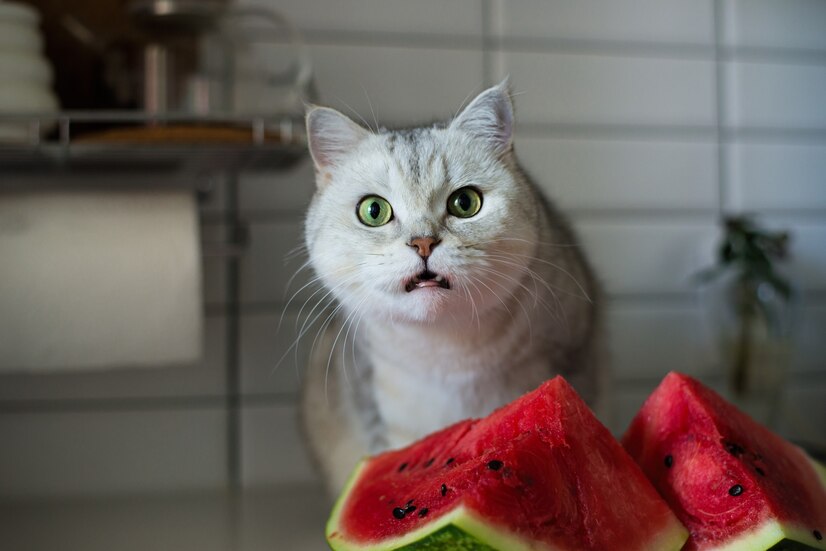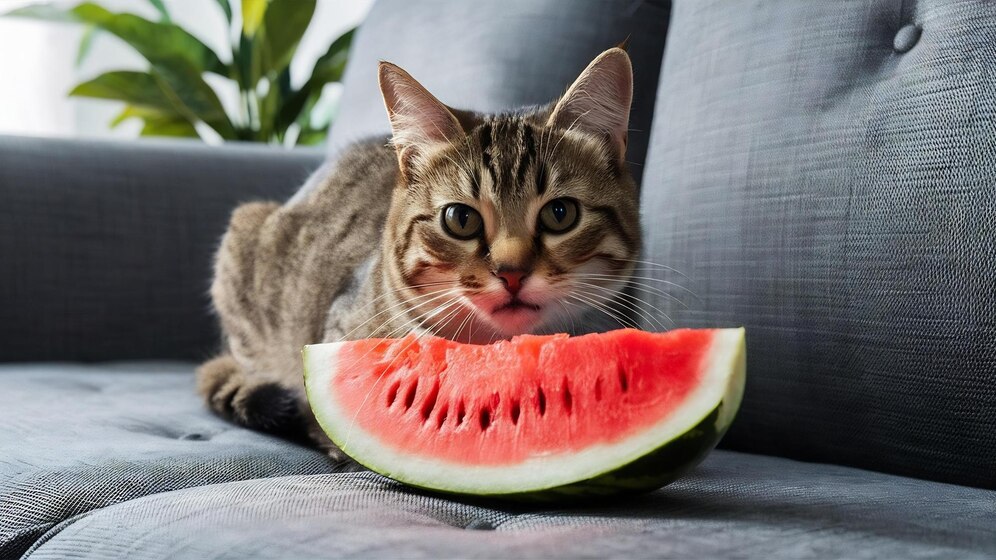Watermelon is a popular summer snack for humans, loved for its refreshing sweetness and hydration benefits. But is it a safe, healthy option for cats? Pet parents might wonder if their feline friends can enjoy this juicy fruit and if they might receive similar health benefits. This article explores whether cats can eat watermelon, when it might be safe, potential health benefits and risks, and how to prepare this treat safely.
Can Cats Eat Watermelon? The Basics
Yes, cats can eat watermelon in small, occasional portions. Watermelon is non-toxic for cats, making it generally safe for healthy felines if given in moderation. However, there are crucial factors to consider, such as your cat’s overall health and dietary needs, to ensure that watermelon is the right treat for your specific pet. Read Can Cats Eat Apples? Yes, But How Much
The Nutritional Profile of Watermelon for Cats
While watermelon offers a boost of vitamins A, B1, B5, and C and is high in potassium and magnesium, these nutrients aren’t particularly beneficial to cats. Cats are obligate carnivores, meaning they require nutrients found in animal proteins rather than fruits or vegetables. Their digestive systems are designed for meat, making them less efficient at processing carbohydrates and sugars found in fruits.

Is Watermelon Good for Cats?
Watermelon might sound like a fun treat, but it isn’t essential or particularly nutritious for cats. Here’s why:
- Carbohydrates and Sugars: Cats do not naturally require carbohydrates or sugars in their diet, and watermelon contains both. Consuming too much sugar can lead to digestive issues like upset stomach or diarrhea.
- Hydration Benefits: Watermelon is 92% water, making it a potential hydrating treat on hot days. But remember, it should never replace water in a cat’s diet.
- Vitamins and Minerals: While watermelon contains vitamins and electrolytes, the benefit to cats is minimal. A complete feline diet provides all necessary nutrients without the potential drawbacks of fruits.
When Can Watermelon Be Helpful for Cats?
Under certain conditions and with veterinary approval, watermelon might serve a specific purpose. Some veterinarians suggest it as a hydrating treat or as a way to clear heat and inflammation in cats. This is often considered under a traditional Chinese veterinary medicine perspective. However, for the average cat, a balanced diet is the best source of hydration and nutrition.
Read Can cats see colors?
The Risks of Feeding Watermelon to Cats
Before you give your kitty a slice, it’s essential to understand the risks associated with watermelon. While not toxic, watermelon can present issues, especially for certain cats:
- Sugar Content: High sugar content makes it unsuitable for cats with diabetes or those who are overweight. Even healthy cats may experience sugar spikes, potentially leading to weight gain or digestive troubles if they consume too much.
- Digestive Disturbance: Because fruit isn’t part of a cat’s natural diet, they may experience vomiting, diarrhea, or stomach discomfort after eating watermelon.
- Watermelon Seeds: Seeds should be entirely removed as they pose a choking hazard. Seeds also contain cyanide, which, while minimal in small amounts, is toxic to cats and can accumulate with regular intake.
- Watermelon Rind: The rind is tough, hard to digest, and can cause choking or blockages if ingested.
How to Safely Feed Watermelon to Cats
If your cat seems curious and you’d like to let them try a small piece, there are some important safety steps to follow. Here’s how to make watermelon a safe treat:
- Select Fresh Watermelon: Rinse the watermelon before cutting to ensure cleanliness, especially if it’s not organic.
- Remove Seeds and Rind: Always remove seeds entirely and discard the rind. This minimizes risks of choking, cyanide exposure, and digestive issues.
- Cut Into Bite-Sized Pieces: A single 1-inch square of watermelon flesh, chopped into smaller bite-sized pieces, is plenty for your cat. This small portion size is both safe and easy to consume.
- Limit Frequency: Because of the sugar and carbohydrate content, only offer watermelon occasionally – no more than once or twice a week. Cats don’t need this treat regularly.
Do Cats Like Watermelon?
Cats’ taste preferences vary, and while some might take a nibble, others may not show interest. Cats lack the taste receptors for sweetness, so it’s unlikely that they enjoy the taste. Any attraction to watermelon is likely due to its moisture or unique texture. Read Do Cats See in the Dark? How Much Better Than Humans
Health Considerations: When to Avoid Watermelon
Some cats should avoid watermelon entirely due to potential health complications. Cats with diabetes, obesity, or specific gastrointestinal sensitivities may experience adverse effects from even small amounts of watermelon. In these cases, the sugars in watermelon can lead to blood sugar spikes or worsen weight and health conditions.
Cats and the 10 Percent Treat Rule
Whenever introducing any treat, watermelon included, it’s crucial to follow the 10 percent rule. This means that no more than 10 percent of a cat’s daily caloric intake should come from treats. The other 90 percent should be from balanced, complete cat food. This balance supports their nutritional needs and ensures treats don’t disrupt their diet. Read Can Cats Talk? Can Cats Really Talk to Us?
Frequently Asked Questions About Cats and Watermelon
Q: Can cats eat watermelon seeds or rind?
A: No, seeds and rinds should be avoided entirely. Seeds contain cyanide, which is toxic, and both seeds and rind pose a choking risk or could lead to blockages.
Q: Is seedless watermelon a better option?
A: Yes, seedless watermelon reduces the risk of cyanide exposure and choking. However, even seedless varieties may contain small, soft seeds that are best removed.
Q: Can cats eat other fruits?
A: Some fruits are safe for cats in small quantities, like blueberries and apples (without seeds). However, certain fruits, such as grapes, raisins, citrus, and cherries, are toxic and should never be given to cats.
Final Thoughts on Feeding Watermelon to Cats
Watermelon can be a refreshing snack for humans, but for cats, it’s largely unnecessary. If your feline shows interest, offering a tiny, seedless piece as an occasional treat is safe, provided they’re healthy and tolerate it well. Always watch for any digestive reactions, and don’t be surprised if your cat turns their nose up at this fruit – after all, they’re natural carnivores.
Read How to Stop Your Cat from Peeing Outside the Litter Box
Remember to consult your veterinarian before adding any new treats to your cat’s diet, especially if they have existing health issues. While watermelon isn’t harmful in moderation, cats thrive best on a high-protein, meat-based diet.
Read Further
How to Punish a cat for Pooping Outside the Litter Box
Why Is My Cat Laying in the Litter Box?
Can Cats Eat Steak? Here’s What Every Cat Parent Should Know



